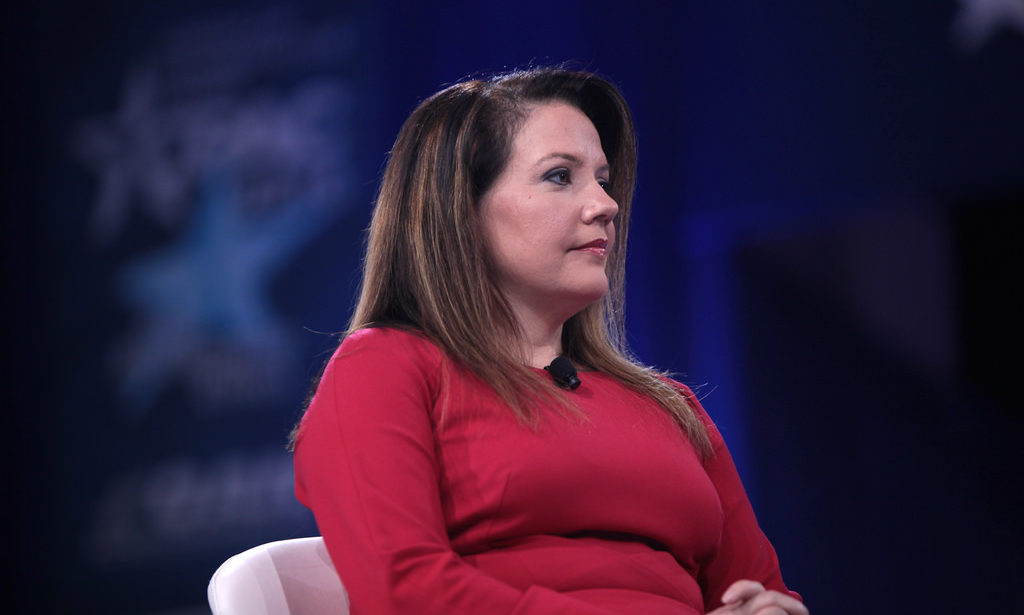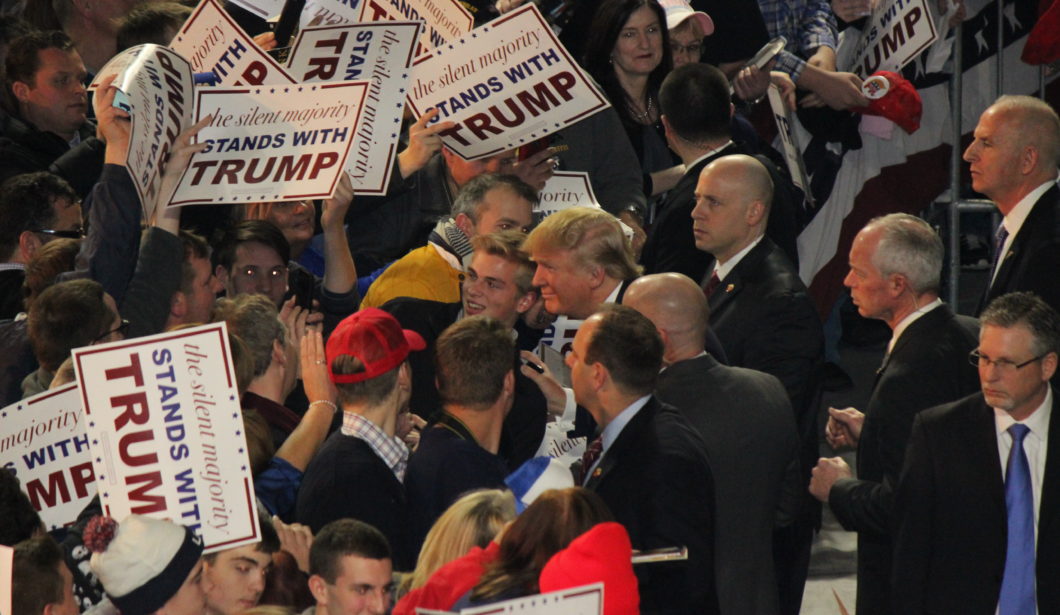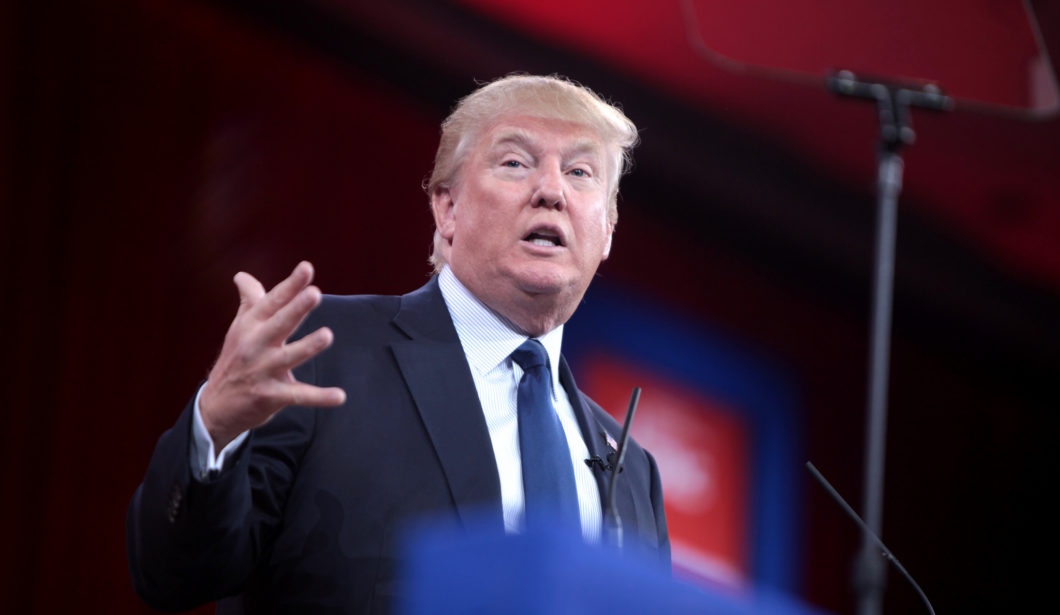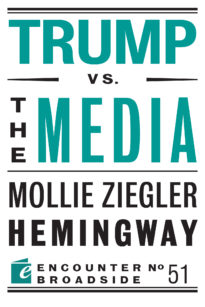Mollie Hemingway sat down with ChangeUp Media’s Ben Weingarten to discuss her new Encounter Broadside Trump vs. The Media. What follows is a full transcript of their discussion, slightly modified for clarity.
You can also listen to their interview in its entirety below. And to automatically receive Encounter Books Podcast interviews like these, be sure to subscribe to our podcast in the iTunes store.
Ben Weingarten: Mollie, our listeners have long known that the media has a left-wing bias, from Pauline Kael syndrome to today. What made its efforts during the 2016 presidential election different enough that you, as a media critic, were compelled to write this broadside?
Mollie Hemingway: So, I have been looking at the media for a really long time, and it was clear that there was something just truly different about what happened in 2016. And I think it’s that while we have been in this climate of talking about media bias for many decades, there was no pretense left after 2016.
You had journalists openly talking about how they felt their job was to prevent Donald Trump from being elected. They would sort of talk about how they were in anguish about what that meant about how to cover Hillary Clinton versus Donald Trump. These were things that people saw prior to 2016, but it was all laid bare.

“There are systematic problems in the media establishment that make them uniquely unable to understand the people they’re supposed to be serving.”
And in that trade, they decided to trade these things that they had, like objectivity — or ‘attempt at objectivity’ is probably a better way of putting it — and service, trying to serve the public good and serve all people, whether they are liberal or conservative. They traded those in with this desire to defeat Trump. And then he won. And so, I was just kind of curious about what happened there, why did that happen and at what cost?
Ben Weingarten: And so, in this case, we have an instance where media bias was not just reflected in the coverage, but it actually clouded their [media members’] analysis to the degree to which they felt that their job was to expose the truth about what was occurring in America and what was impacting voters. In terms of getting the election result, their predictions so horribly wrong, why should anyone have assumed that a press that largely consists of a uniformly leftist intelligentsia, or sometimes unintelligentsia, would have understood what was going on in the parts of the country and among the people that helped elect Donald Trump as president, given that the people who voted for Trump were so different from the people covering the election itself?
Mollie Hemingway: When you put it that way it is kind of striking that we were surprised that people were surprised by the result of the election. There were things…There are systematic problems in the media establishment that make them uniquely unable to understand the people that they’re supposed to be serving in terms of readers and viewers.
I think maybe in the past there was a better attempt to have sort of a systematic opposition, by which I mean, it’s kind of like how Vladimir Putin gives people an option of — if they oppose him — of either working within the system or outside the system. And it’s a pretty easy pick for most people, ’cause if you work outside the system you might end up dead, whereas if you work inside the system he sort of listens to what you have to say so he can shape how he runs the country.
And in the past, I think we had maybe a slightly…We had some sort of systematic opposition, where you had conservatives who could kind of let people in the media who were overwhelmingly liberal understand what conservative concerns were, to the point that they could kind of address them as they did their biased coverage.
But in this case, everything was so weird with the Trump phenomenon, in part because conservative leaders themselves didn’t understand what was going on — particularly for a long part of the Republican primary process. And so they weren’t getting that information that they would normally get to check their coverage and check their biases just a little bit. And so it made it more obvious at that point.

Ben Weingarten: How much of the media’s hatred of President Trump expressed during the election and now subsequently in his presidency, in your view, was based on style versus his ideological principles or his policy views, given his heterodox positions, the fact that he had a “D” next to his name for much of public life and the hundreds of thousands of dollars he contributed to Democrats as well?
Mollie Hemingway: Not to use another Russian example, but if you think the Russians were meddling…If you understand why they were meddling, it wasn’t so much that they loved Donald Trump, but they really hated Hillary Clinton.
And I think that when you look at a man like Donald Trump, who isn’t particularly conservative, very populist and has been for a long time — and some of that overlaps with conservatism, a lot of it doesn’t…But someone who they kind of worked with for a long time, they enabled for him for decades and he learned the craft of how to use the media to help out business enterprises and what-not, through the mean streets of New York City media environment.
“Unlike most other Republican candidates, Trump figured out that the media don’t have the power that they think they do.”
And everything was fine for a really long time. The main problem seemed to be two things: One, there was something very personal in opposition to him doing the birtherism that he did, throughout the Obama presidency. So, they loved President Obama, and they took it very personally that he was playing these birther games, and that’s totally reasonable. And then the second thing being that he became the biggest threat to Hillary Clinton, who they had every plan of coronating as the next president.
And so, even though his own politics and policies might not have been so at odds, although in some cases they were dramatically at odds…And the other issue being that he figured out, unlike every other Republican candidate who ever existed or…That’s a little bit of an exaggeration. Unlike most other Republican candidates, he figured out that the media don’t have the power that they think they do. And so when they try and push a narrative against Republicans, most Republicans will cower and just try and think about, “What can we do to make the media like us more?” And instead, he would just get more extreme. He would say something more outlandish or more different than what their preferred narrative was. And it was just explosive.
Ben Weingarten: And President Trump has a way of, in essence, triggering the media, and he really proved to be a master manipulator in a way that, certainly in my lifetime and maybe ever, no Republican presidential candidate has had it. Scott Adams has, of course, written about this expertly and I think brilliantly in his Dilbert blog. What in your view is the lesson of President Trump for future Republican candidates or any candidates, really, in terms of handling the media assault?
Why Republican candidates continue to think the media are all-powerful, and can control things when they have lost all this trust and credibility is beyond me.
Mollie Hemingway: The thing that just shocks me, actually, is that even after the success of Donald Trump, where he had this presidential victory in the face of unbelievable media hostility, and he had this victory in part by exploiting people’s hatred of the media, which we now see…The proof in the pudding being that he won the presidency, but even just if you look at polls and what-not when people report what they think about the media, Republicans are just off the cliff in terms of whether they trust in media in any way, shape or form. I think it’s unfortunately a number that might have no return — there’s just so much loss of trust with the media.
But even on the other side of the aisle, you have people really not believing in the media too. So, why Republican candidates continue to think the media are all-powerful, and can control things when they have lost all this trust and credibility is beyond me. And yet you have seen that even past the 2016 election, that most Republicans are sort of returning to type and cowering and being worried about what the media might say. And that is a very bizarre lesson to take from the 2016 election.
Ben Weingarten: You recount a number of breathtaking stories of not only media bias but, frankly, malpractice during the 2016 election. What in your view was the most brazen media act exposed during the presidential race?
Mollie Hemingway: Oh, that is a good question and a tough one, because I think that the problems with media coverage — each of the problems had their own serious problems.
So, one thing that kind of struck me for some reason was the…It seems like an unimportant story, but the Alicia Machado story. And this is where Hillary Clinton really kind of forced an answer in I think it was the first debate. Right at the end, she kind of had an answer that didn’t match with the question exactly, but it was clear she really wanted to get the words ‘Alicia Machado’ in.
And she tells the story about a beauty contestant who is called fat by Donald Trump, and how she’d just become an American citizen, and she was very excited to vote against Donald Trump. And so, this was very standard, but very good campaigning, and clearly an opposition research win for the Clinton campaign.
What was interesting to me was that as soon she mentioned those words, within a couple of hours you had multiple media outlets that had packages ready to go on Alicia Machado. Sometimes these included very fancy photo spreads like Alicia Machado draped in the American flag or what-not. So it was clear that they had coordinated and embargoed these stories waiting for them to be mentioned in a debate.
That’s the type of coordination between the media and Democratic campaign that people had suspected but was kind of laid bare again during the 2016 campaign. And the media chose to tell this story exactly the way that Hillary Clinton told this story.

And what was interesting about it is, it was a story that also kind of confirmed the Donald Trump narrative. So it turned out first off that at the time that Machado was the Miss Universe contestant, she did pack on a lot of weight, and the media were pretty hostile to her at the time. So the same media that are lambasting Donald Trump for supposedly fat-shaming her were doing exactly that at the time that this happened. But it turned out also that she had been involved in some murders, driven a getaway car, threatened the life of a judge, maybe had a baby with a drug kingpin in Mexico.
And so, when you think about the actual message of the two campaigns and Donald Trump’s message with regard to immigration was definitely, “Maybe we should be vetting some of our immigrants better than we are,” this story of Machado and all of her problems made it seem like maybe this is not the ideal American citizen that we’re bringing into the country, and in effect, helped Donald Trump’s message. But the media didn’t realize that they were doing this as they were sort of carrying the water of the Hillary Clinton campaign.
Ben Weingarten: Some have been very gleeful in the wake of Bret Stephens, formerly of the Wall Street Journal, being hired to the editorial page of the New York Times as a sign that suddenly the left understand that they must give voice to other perspectives — not acknowledging, of course, that Bret Stephens was one of the most hostile journalists at the Wall Street Journal to Donald Trump throughout the 2016 presidential election. Is there any evidence to suggest that the media has learned anything from its failures during the 2016 election?
Mollie Hemingway: So what should have happened after the election — and this was a huge embarrassment for the media, or should have been — is a, first off, an apology, an admission that they had done a really bad job covering this election, understanding what people were voting for and why, and just a real full-throated mea culpa. “We are so sorry. We really understand now we have failed at our jobs,” because that was obvious. So first an apology.
“(The media) should have changed their hiring and promotion practices. And instead what you saw was that some of the worst offenders in terms of how they covered the president were promoted or elevated.”
Second, just a return to, for the love of all that’s holy, stop pushing narratives and just report the facts. Stop telling us what this Donald Trump joke actually means, and what it signifies. Just tell us what the joke was, and let people make their own decisions about what it means, or host an honest debate about what his rhetoric means, or just cover an event without trying to push an agenda and go after people whose views are different than yours.
And then ultimately what should have happened was changes in hiring and promotion, not just at the reporter level, but the editor level as well; real changes of bringing in people with different perspectives in that tiny, narrow range of opinion from far left anti-Trumpism to conservative anti-Trumpism, or whatever. This isn’t just a political problem. This is a problem with how the media cover everything, from guns to religion to all sorts of things.
So, they should’ve changed their hiring and promotion practices. And instead what you saw was that some of the worst offenders in terms of how they covered the president were promoted or elevated to different publications — people who really missed the moment and never understood it.
And that’s why, at this moment, you still have people who’d have no idea how to cover Donald Trump, have no idea how to even literally understand what he’s saying; every single day he’ll say something that I think a huge swath of the American public understands easily, and yet they are confused and they’re upset and they’re trying to explain how it’s deeply problematic, and how this is a crisis of existential meaning and what-not. And, instead, they should have hired some people who actually understood the portion of the American electorate that voted Donald Trump into office, and that has just not happened.
Now, Bret Stephens, I was thinking after he published his first column, which was on being skeptical about absolute policy solutions for climate change, in which he fully concedes the point that he believes that humans have caused global warming and that it is a serious problem…He just expresses some doubt about the preferred policy prescriptions or how to determine that, and people are so angry and they’re cancelling their subscriptions over it, and I was thinking, “I wonder if he kind of understands how Trump won now?” Probably not, but he might.
Ben Weingarten: But certainly for the New York Times at least it is more press coverage for them, so maybe that’s the positive.
Mollie Hemingway: I don’t know. At least they did try to reach out and hire someone who is outside of their far left echo chamber. I think it’s much more disconcerting that the Washington Post, which is the town publication of the seat of government, has so, so few people who understand the moment…much less who are sympathetic to it, and that is not good for the in-house publication.
Ben Weingarten: And this is a good segue into one of your more pertinent and prescient quotes in the book which is this: “…the current political situation is the logical result of the hostile and distrustful environment it [the media] cultivated, rather than some blackswan event unleashed by the sudden onset of irrationality of voters in flyover states. It was the media’s decades-long approach of putting its thumb on the scale by covering conservatives and conservative causes poorly that created a lose-lose situation for conservatives. There was no way for them to operate successfully in a system where the media allowed them to be respected as the principled opposition. only as long as they were shackled and limited by biased news coverage. And conservative voters were beyond sick of it.” What are the ramifications of all this?
Mollie Hemingway: Well, it’s not a good situation for our Republic. It’s not good if people feel that they have to lash out in response to an injustice or unfairness of a media environment. And it doesn’t lead to good governance or anything like that, so that’s one of the things that I’m very concerned about.

This decline in the media and the media’s credibility mean that we don’t have a common set of…We don’t have a conversation we can all agree to have together, and we can’t make decisions thoughtfully where we understand the best of all sides of an argument. And it increases tribalism, it increases the chance that things will lead to violence, and that’s why it is so unfortunate that the media chose to do this, that they chose to manipulate their positions to just push raw political wins, and they succeeded in doing so for a very long time.
And when you look at the social changes that they pushed, and pushed relentlessly for decades, it is really remarkable what they were able to do. But the cost was that people are now responding. They [the media] lost their credibility entirely. They lost their trust. They produced a lot of anger in the American people. And there’s just been a total breakdown in civil discourse, and that’s not good for a country that operates in terms of self-government.
We all need to work together and hash out our problems together, and if there are these injustices or these systematic problems that are unfair, it can lead to serious violence.
Ben Weingarten: I suspect that most Americans, if you said that they could be presented with news that was completely free of bias — which is, of course, to some degree impossible, given that even the story selection, regardless of the spin or lack of spin on a story, there’s obviously some kind of bias in terms of selection itself of topics — people might say that they would love an objective straight news source, but people are also very self-selecting. And with the advent of the internet, more opinions and views proliferate than ever before. And this can be a very positive force in some cases, and a negative force in others. I think one of the positives is that people tend, I believe at least, some people now actually go to source documents instead of taking a snippet of a quote that they see in a news story at face value. To that end, do you think that the free market will correct for the media imbalance, or will it only perpetuate some of the problems that we already see?
“The entirety of our populace has been educated under a system that does not really reward or value truth.”
Mollie Hemingway: It’s a really good question, and I’m actually completely unsure. I think the problem…Many of the problems that we have in terms of media consumption are actually personal moral problems or failures of education.
So we have been educating people for decades now…in fact I’d say, the entirety of our populace has been educated under a system that does not really reward or value true…Again, investigation into what truth is or even have high regard for truth itself…a need to consider all arguments before making a decision. These are things that have not been inculcated in us as a people for a very long time. I think we’ve lost a lot of that. We’ve lost an understanding of who we are as a people, or what sets us apart from people in other countries, in terms of our system of governance, and these things do not bode well, no matter what media system we’re in.
And then we have a wonderful market, and it’s a great thing that we have this freedom. At the same time, we have corporations controlling the media, who have incentives that might not be aligned with a search for truth, so much as a search for power or profits; and that there is an imbalance in that system too — which is not to say that that should be corrected through government force or anything like that, but it’s just that these incentives are aligning. The larger a corporation gets, the more it gets set apart from any virtue or desire for truth or other things like that, so I’m not hopeful, exactly.
At the same time, there are technologies and other things that have enabled so many nice things in the media environment, and this is in multiple ways: One thing, for instance, is Twitter, which is this social media platform where journalists signal to each other all the time. They’re constantly signaling to each other about how they’re virtuous, by which I mean they are saying to each other that they’re liberal, and they think that conservatives are bad. And they’re kind of doing that constantly. This reveals for people what they already suspected about the media, that they did have these strong biases that they were unable to overcome. That is a good thing to know, even if it’s kind of dispiriting or discouraging that that’s the situation.
Also, Twitter and other social media platforms, or other technologies, enable people with information or knowledge to get it out there with very low barriers to entry. And if it’s good information, or if it’s news breaking or what-not, there might not be a lot of profit involved for these people, but it is able to get out there in a way that would not have been possible decades ago, when there were very few corporations handling what people would learn about a given news story.
“There’s just been a total breakdown in civil discourse, and that’s not good for a country that operates in terms of self government.”

